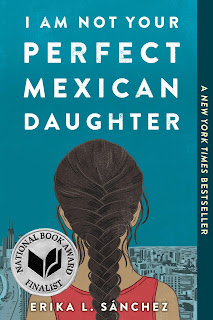Erika L. Sánchez is a poet, a feminist, and a cheerleader for young women everywhere. She was Cosmopolitan for Latinas' sex and love advice columnist for three years, and her writing has appeared in Rolling Stone, Salon, and the Paris Review.In addition, she is a Princeton Arts Fellow. Erika is the author of Lessons on Expulsion, a collection of poetry. Since she was a twelve-year-old nerd in giant bifocals and embroidered vests, Erika has dreamed of writing complex, empowering stories about girls of color. I Am Not Your Perfect Mexican Daughter is her first novel and a National Book Award Finalist. She is fluent in Spanish, Spanglish, and cat. You can find her online at ErikaSanchez.com, or on Twitter.
Perfect Mexican daughters do not go away to college. They do not move out of their parents' house after high school graduation. Perfect Mexican daughters never abandon their family. But Julia is not your perfect Mexican daughter. That was her sister Olga's role. Then a tragic accident leaves Olga dead and Julia reassembling the shattered pieces of her family. And no one seems to acknowledge that Julia is broken, too. Instead, her mother channels her grief into pointing out every possible way Julia has failed. But it' snot long before Julia suspects that Olga might not have been as perfect as everyone thought. With the help of her best friend, Lorena, and her first love (first everything), Connor, Julia is determined to uncover the truth. Was Olga really what she seemed? And how can Julia even attempt to live up to a seemingly impossible ideal?
What immediately strikes me off of books from the TIME Top 100 YA Books of All Time list is that they all seem to have a very strong voice—and I Am Not Your Perfect Mexican Daughter is no different. Julia's voice immediately pulls you into the story, with a combination of witty humor and striking candor. This way, the story is both funny and entertaining, while also having a sharper, dark edge. Julia's life is not easy, and thus her story can't be easy to tell, but Sánchez is able to maintain a degree of levity through dark humor, without shying away from everything that's dark to start.
Speaking of dark to start, this story does start off in a dark place—at Olga's funeral. I was so excited to see how Olga's and Julia's relationship would be depicted, especially since Olga is dead, and Julia is reeling from that, as well as from the weight of her parents' expectations. More than anything, this novel provides a portrait of immigrant life, especially one that is completely overturned by tragedy. This novel's strength is in its ability to depict what it is like to be an imperfect daughter of an immigrant. It is not about anything more than Julia's experiences over the course of two-or-so years after her sister dies. And these experiences speak loudly, more so than any sort of specific plot would.
However, there is something about the pacing of the story that threw me off, and is the reason it was a four-star read for me. While I was incredibly invested in Julia's recovering from the loss of her sister, and in understanding her family's dynamics, we also have some clues that Olga is not who she seems. However, the reveal of exactly what Olga is up to happens quite late in the novel, and I didn't feel like there was a clear resolution to Julia's dilemma of what to do with family secrets. I am perfectly okay with Julia deciding to never talk to her mom about the secrets, but I had hoped for a clearer decision on that near the end, and to have a more consistent mystery about Olga's personal life throughout Julia's narration. In the end, I felt like there was just a lot of potential to expand on Olga and Julia's relationship and on the mystery and its implications, which left something to be desired for me.
One of the things I most appreciated was how Sánchez didn't give Connor to Julia, or to readers, right off the bat. In fact, Connor isn't as big a character as the blurb of the novel makes him out to be. I adored that, because it demonstrates that this novel isn't a romance, and that the main focus shouldn't be Julia's relationships with boys. Rather, it's about her journey to discover who she is in the wake of tragedy, and her recovery from such a loss, and her battle with her family to be who she wants to be. Connor, while part of that discovery process, isn't the lynchpin, and isn't depicted in a way that would make him seem more important than he is. This is a brilliant move that highlights exactly where the focus of the novel should remain.
As some of my friends may have guessed, I'm currently sporadically reading my way through TIME's Best YA Books of All Time, and having such a fun time doing so! Check out my other reviews from this list here.
*This review can also be found on my Goodreads page*

Comments
Post a Comment